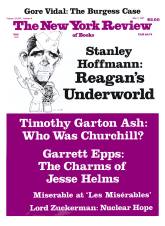In response to:
An Exchange on Ezra Pound from the October 9, 1986 issue
To the Editors:
In early October 1938 my husband, Laurence Vail, and I paid a visit to a friend of over ten years’ standing. He lived in Rapallo, and some time in the past he had presented a bronze bust of himself to the town. There it stood in the square, larger than life, which was always what he wanted to be.
It was a few days after Neville Chamberlain’s historic appeasement deal with Hitler, and our friend was jubilant. He told us as we sat on the square’s café terrace that first evening (with two Japanese students who had come to Italy to acquire a knowledge of classical Greek poetry merely being in his presence) that this was beginning of the end for America and England, overrun with Jews as both countries were. The Jewish international conspiracy, he shouted out, as if wanting the whole world to hear, would be exposed and America and England would be brought to their knees (as Chamberlain had been) and the two greatest statesmen of our time would triumph. Hitler and Mussolini were their names.
Later that night he spoke bitterly of the Chinese critics and poets who were not as enthusiastic over his translations of classical Chinese poetry as they should have been. So now he was turning to the Japanese for a more enlightened appreciation of his labors. The two Japanese students were pleased when our friend added that the Chinese had stolen their vaunted culture directly and ruthlessly from the Japanese.
That was the last time I saw Ezra Pound. I did not visit him at Saint Elizabeth’s. In his life and in his work, I see him as a man desperate for power, thirsting and starving for power, no matter how demeaning the conditions for attaining it might be. I look in vain for the “courage” that Michael Reck asks us to remember and revere Pound for [“An Exchange on Ezra Pound,” NYR, October 9, 1986]. Nor am I able to find evidence in his life or work of Pound’s “profound hatred of war” that Theodore Weiss cites [NYR, October 9, 1986]. Reck’s and Weiss’s letters do serve, however, as verification of Alfred Kazin’s rational article on Pound [NYR, March 13, 1986]. Kazin’s spirited reply [NYR, October 9, 1986] should bring Mr. Reck and Mr. Weiss a little closer to reality.
Kay Boyle
Oakland, California
This Issue
May 7, 1987



